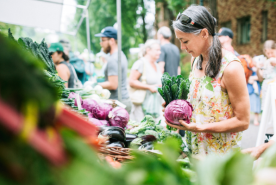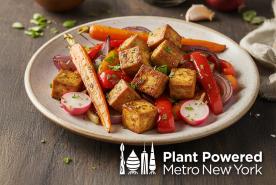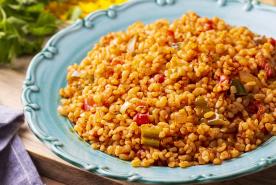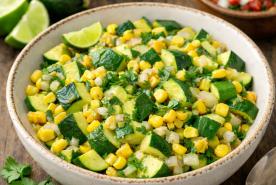Myths about plant-based diets debunked: it's not about giving up all animal products, it's cost-effective, and can fit into social and dining situations.
What comes to mind when you hear the word “plant-based diet”? Too expensive? Too boring? Too hard to follow? If you’re like many people, you may have some misconceptions. Here, we discuss a few.
It means becoming a vegetarian
Not true. In fact, most experts agree that having some meat, fish, poultry, or dairy in small amounts is healthy. The goal is having them less often and in smaller portions. “We would all be healthier eating less meat, but less does not necessarily mean none,” says Marion Nestle, professor of nutrition, food studies, and public health at New York University in New York. One way of doing it? Think of eating meat, fish, and poultry as a garnish, side dish, or treat rather than your everyday main meal. Or think of having it on some days of the week but not others.
I’ll have to give up all my favorite foods and snacks
There might be some you should not eat, especially if you have kidney disease or kidney failure. But that doesn’t mean you can’t enjoy what you eat. “You might try saving your favorites for treats, and not eating too much at any one time,” says Marion Nestle. A dietitian can help. Ask about recommendations for vegetarian cookbooks and websites. You may be surprised by the many flavorful foods, tasty deserts, and healthy snacks that you can still eat on a plant-based diet. Some examples? Try frozen fruits like grapes, blueberries, and strawberries instead of sugary popsicles. Stock your fridge with “healthy” snacks like carrots celery sticks, unsalted nuts, and fruit. Love grilling? Try adding grilled fruit to your favorite summer meals. The Academy of Nutrition and Dietetics website has many recipes and tips: www.vegtariannutrition.net
It’s expensive
Not true. You’ll be eating lots of beans, legumes, and whole grains, which cost less than meat or fish – and they’re packed with protein, vitamins, and minerals. “Throughout history, the human diet has been made up mostly of wheat, rice, corn, potatoes and beans. Even today, these are all inexpensive foods. Leafy greens, some vegetables like broccoli or carrots, and seasonal fruits can be a little pricey, but there are plenty that are not,” says Marion Nestle.
Even if you buy the “more costly” vegetables or fruits, a little bit goes a long way toward filling you up and giving health benefits. Another bonus? “Since you’re eating less meat, you’ll probably have a little extra money in your grocery budget for the higher-priced vegetables and fruits,” says Mark Bittman, food columnist and author of The Food Matters Cookbook and How to Cook Everything Vegetarian.
I’ll be eating only bland, boring meals forever
That's doesn't have to be the case. In fact, most experts argue that eating a large variety of foods is the best way to eat healthy and get all the nutrients your body needs. “Even if you follow a diet that is 80% or 90% plants (which is a lot), there’s still plenty of variety to choose from,” says Mark Bittman. Try browsing the produce aisle of your supermarket. Most are loaded with a huge variety of vegetables and fruits, especially in season. You’ll also find many varieties of beans, nuts, seeds, legumes, pastas, noodles, rice, cereals, grains, spices and herbs. Explore ethnic foods and new styles of cooking. For example, Indian cuisine does amazing things with lentils, spinach, and spice. Make it fun. Try foods you’ve never eaten before. Look for new recipes. There are several good cookbooks geared for people who want to experiment with plant-based diets.
I can’t eat at restaurants anymore
Really? It’s true that eating healthy when dining out can be a challenge in a world filled with fast-food restaurants, but it’s not impossible. Almost all restaurants nowadays have some meatless choices on the menu, like salads, soups, or pastas. Try coming up with a strategy for the nights you dine out, like choosing several vegetable side-dishes or soup and salad. Call ahead and ask if they’re willing to make substitutes. “Unless you’re only going to fast-food places, every restaurant can accommodate a plant-based diet nowadays,” says Mark Bittman.
Dining at someone else’s home will be impossible
Remember, a plant-based diet means eating less animal products, but it doesn’t mean excluding them completely. You don’t have to shy away from dinner invitations and parties or worry about insulting your host. You can still show up and eat whatever your host offers. Make it one of the nights you allow yourself to eat meat, fish, or poultry. “If you know your host well enough, a word in advance about your preferences can go a long way,” says Marian Nestle.
I won’t get enough protein, vitamins, calcium, and other nutrients
Not true. By eating a wide variety of wholesome foods, you can get all the nutrients your body needs. Beans, whole grains, fruits, and vegetables are packed with nutrients. You simply need to change proportion of what you eat in favor of others. Remember, you can still eat your favorite animal-based foods. You just eat smaller portions and less often. Your health professional or dietitian can help you create a meal plan that’s right for you.
I can’t follow a plant-based diet if I have kidney disease or kidney failure
In fact, following a plant-based diet might have health benefits for people with kidney disease--if you know how to do it wisely. Ask your health professional if a plant-based diet is right for you. Remember, there is no one diet that is right for everyone with kidney disease. What you can and cannot eat changes over time, depending on how much kidney function you have and whether you have other health problems, like diabetes or heart disease.
Want an easy way to start eating less meat? Go Meatless Monday every week, and get regular tips and recipes by following #MeatlessMonday and learning more at MeatlessMonday.com.

















